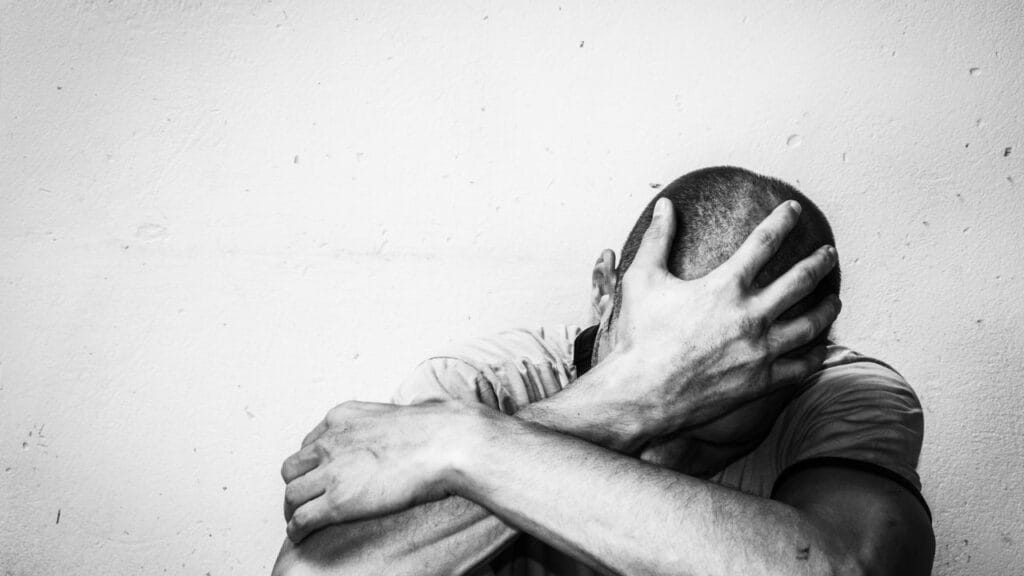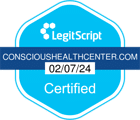
Depression Treatment
Table of Contents
What Is Depression?
Depression is a complex mental health condition classified by persistent negative feelings like sadness, hopelessness, or lack of interest in daily activities. It’s a challenge that affects millions, showing the need for more options for those in search of depression treatment. Many times, a person will start with traditional approaches to therapy for depression, but to no avail. This is why, with modern science and emerging research, Conscious Health is here to help you reach a new level of well-being.

What is Major Depressive Disorder?
Major Depressive Disorder (MDD) is a severe form of depression. As your guide, we offer a range of major depressive disorder therapy options, providing a beacon of hope through treatment for major depressive disorders. Our treatments integrate traditional therapies with innovative modalities tailored to navigate the complexities of MDD where other forms of treatment are not effective.
Symptoms of Major Depressive Disorder Include:
- Persistent feelings of sadness or emptiness
- Loss of interest in hobbies and activities
- Fatigue or lack of energy [1]
- Changes in appetite or weight
- Difficulty concentrating or making decisions
- Sleep disturbances, sleeping too much or too little
- Thoughts of death or suicide
- Physical aches and pains with no clear cause
Traditional Major Depressive Disorder Therapy Options
Typical therapy for Major Depressive Disorder can include:
- Therapy: Therapies like CBT (Cognitive Behavioral Therapy) for major depressive disorder among others are commonly used to treat various challenges
- Medication: Psychiatrists will work with patients by prescribing, and managing medications with daily dosage of medications like SSRIs and SNRIs
Many times, traditional treatments don’t show the results a person needs to feel relief from their MDD. It is estimated through data that 30% of people diagnosed with MDD are treatment-resistant [2]. Alternative advanced treatments are available beyond conventional medication and therapy at Conscious Health, which is shown as the best therapy for major depressive disorder symptoms when other treatments have failed prior.
Overcoming Treatment-Resistant Depression
What is Treatment-Resistant Depression?
Treatment-resistant depression (TRD) refers to depressive episodes that do not respond adequately to typical treatment attempts. It represents a significant challenge, requiring specialized strategies beyond conventional approaches. Conscious Health provides hope and innovative treatments for those battling TRD, offering a support system to uplift and guide you through this journey.
Treatments for Treatment-Resistant Depression at Conscious Health:
Facing treatment-resistant depression head-on, we offer innovative therapies such as Transcranial Magnetic Stimulation (TMS) and Ketamine Infusion. These treatments provide new hope for those who have found traditional methods insufficient, illuminating a path through the darkness of TRD with many services to guide the way:
- Transcranial Magnetic Stimulation (TMS): A non-invasive treatment using magnetic fields.
- Ketamine Therapy: Offers rapid relief from depressive symptoms in TRD cases, prescribed in conjunction with working with a clinician either the same day or the day following the infusion, depending on your treatment plan.
A new life can begin today, away from the grips of TRD, with just a phone call.
Your Own Treatment Plan for Treatment-Resistant Depression
Personalized Treatment Plans: Designed to meet your unique needs and goals
Comprehensive Care: A holistic approach addressing mental, emotional, spiritual, and physical aspects.
Navigating A Treatment Plan for Depression & TRD
The path through major depressive disorder and treatment-resistant depression is fraught with challenges. Our team provides continuous support, monitors progress, and adjusts treatments as necessary, ensuring you remain steadfast on your journey to wellness.
- Continuous Support: A dedicated team to guide you through
your treatment journey - Adjusting Treatments: Flexible strategies to meet evolving
needs and challenges
Through dedicated major depressive disorder therapy, you gain valuable insights and tools that empower you to reclaim your life from the shadows of depression. This empowerment is a treasure, transforming challenges into stepping stones toward a healthier, more vibrant existence.
Recovering from Depression: The Road After
Once established and the healing begins in major depressive disorder treatment, you find a renewed sense of self and purpose. This transformation marks the culmination of your courage, the tools you’ve learned and used, and the effectiveness of your personalized treatment plan.
- Renewed purpose: Finding new meaning and direction in life post-treatment.
- Transformation: Experiencing a profound change in how you view yourself and the world.
Once you’ve navigated the trials of depression through depression treatments that work, your experience becomes a beacon of hope for others. Your journey offers inspiration and insight, illuminating the path for those you love. You can reflect on your journey healing from depression and celebrate the profound change within.
Begin Treatment for Depression, MDD and TRD in Los Angeles, California Today
At Conscious Health & Wellness Center, we are dedicated to guiding you through the complexities of depression, lighting the path toward healing and transformation. Whether battling major depressive disorder or the challenges of treatment-resistant depression, our holistic, personalized approach is designed to help you reclaim your life.
Frequently Asked Questions
If you’re experiencing persistent sadness, loss of interest in activities, or changes in appetite and sleep, these could be signs of depression. Only a licensed professional, like the team at Conscious Health, can provide a correct diagnosis and make proper treatment recommendations for you. It’s best to reach out and be seen to give yourself the best chance of healing.
Yes, depression can lead to difficulties with memory due to stress responses from depression. It may affect concentration and the ability to remember specific details, which can impact daily memory function.
Major Depressive Disorder (MDD) is a more severe form of depression characterized by intense and persistent feelings of sadness and a lack of interest in life. While everyone feels down from time to time, MDD is diagnosed when symptoms are severe enough to interfere significantly with daily activities and last for at least two weeks. In contrast, general depression might refer to less severe symptoms that are more manageable and may not last as long.
Persistent Depressive Disorder (PDD), also known as dysthymia, differs from Major Depressive Disorder (MDD) in its duration and severity. A chronic state of depression characterizes PDD; the symptoms are not as severe as MDD but are more constant, lasting for at least two years. On the other hand, MDD involves more intense symptoms that significantly disrupt daily life, but these episodes are typically shorter, though they can recur. Both disorders affect mood and functioning, but the chronic nature of PDD can make it a pervasive part of one’s daily experience, whereas MDD tends to be more episodic.
Bipolar disorder and Major Depressive Disorder are distinct diagnoses; one individual is not typically diagnosed with both simultaneously. Bipolar disorder involves periods of depression as well as episodes of mania or hypomania, which are not seen in MDD. If someone with bipolar disorder is experiencing a depressive episode, it is considered part of the bipolar spectrum, not a separate occurrence of MDD.
Major Depressive Disorder (MDD) can be considered a disability if it limits one or more major life activities, such as working, sleeping, or learning. In the United States, for example, MDD may qualify as a disability under the Americans with Disabilities Act (ADA), and individuals may be entitled to accommodations at work or may be eligible for disability benefits through programs, depending on the severity and impact on daily functioning. It’s important for individuals to consult with healthcare professionals to understand their diagnosis, receive treatment and learn about the support available.
Major Depressive Disorder (also known as “MDD” or “Depression”) is a common but serious mood disorder that affects many aspects of a person’s life. However, when depression does not respond to standard treatments such as antidepressants or psychotherapy, it is often termed “Treatment-Resistant Depression” (TRD). This condition represents a significant challenge in mental health care, requiring a deeper understanding and, often, more complex interventions.
Identifying TRD involves a careful evaluation of your response to treatment. You may have Treatment-Resistant Depression if:
- You’ve tried multiple antidepressants (at least two) at an adequate dose and duration without significant improvement.
- Your symptoms persist despite switching medications or adding therapies.
- Psychotherapy hasn’t led to improvement when used alongside medications.
If you suspect you have TRD, it’s essential to consult our specialists at Conscious Health for an accurate diagnosis and to discuss potential treatment options to use in sync with your current treatment, including newer approaches such as Ketamine Therapy, TMS, or EMBP. A combined approach enhances the chance for successful and effective treatment of Treatment-Resistant Depression, leading to a higher quality of life!
The causes of TRD can be complex and multifactorial. Identifying the underlying reasons is essential for effective management and can include:
- Genetic Factors: A person’s genetic makeup can affect how well they respond to antidepressants.
- Biological Considerations: Changes in brain chemistry or hormone imbalances might contribute to the resistance of depression to conventional treatment methods for MDD.
- Psychological Components: Co-existing mental health conditions, such as anxiety or bipolar disorder, can complicate the treatment of depression.
- Environmental Influences: Ongoing stress, traumatic life events, or chronic illness can exacerbate depressive symptoms and hinder treatment efficacy.
Treatment-Resistant Depression (TRD) is more prevalent than one might assume. It is estimated that approximately one-third of those with major depression may be considered treatment-resistant. Studies show that TRD often requires multiple treatment trials and a combination of different modalities.
The prevalence of TRD underscores the need for continued research and development of new therapeutic options, which is where Conscious Health stands at the forefront of cutting-edge, evidence-based treatments for Treatment-Resistant Depression and other mental health challenges.
When standard antidepressants and talk therapies do not yield results, healthcare providers may look to alternative and adjunctive therapies. Some of these include:
- Medication Augmentation with Ketamine: Utilizing ketamine, which has shown promise for rapid relief of depressive symptoms when other medications have failed.
- Psychotherapy: Integrated alongside ketamine treatments, psychotherapy that encompasses every aspect of your person using the three principles of interpersonal psychology.
- Lifestyle Modifications: Encouraging exercise, balanced nutrition, and proper sleep hygiene have been shown to help improve mental wellness for anyone, not just those who live with Treatment-Resistant Depression.
- Mindfulness Practices: Engaging in stress-reduction techniques.
- Advanced Therapies: Exploring TMS (Transcranial Magnetic Stimulation), EMBP (Electromagnetic Brain Pulsing Therapy), and more modalities are innovative treatments showing much promise in treating TRD.
There is no “cure” for Depression, MDD, or TRD. However, with modern options offered at Conscious Health, you can gain long-term relief from your symptoms. Armed with new insights and coping strategies from the best therapy for depression in modern science, you’re equipped to integrate these learnings into daily life. This phase is critical for sustaining the gains made during treatment and ensuring long-term resilience against depression.
Sources
- Targum, S. D., & Fava, M. (2011). Fatigue as a residual symptom of depression. Innovations in Clinical Neuroscience, 8(10), 40–43. PMCID: PMC3225130. PMID: 22132370.
Retrieved from: https://www.ncbi.nlm.nih.gov/pmc/articles/PMC3225130/ - Zhdanava, M., Pilon, D., Ghelerter, I., Chow, W., Joshi, K., Lefebvre, P., & Sheehan, J. J. (2021). The prevalence and national burden of treatment-resistant depression and major depressive disorder in the United States. J Clin Psychiatry, 82(2), 20m13699. doi: 10.4088/JCP.20m13699. PMID: 33989464
Retrieved from: https://pubmed.ncbi.nlm.nih.gov/33989464/
Learn More
Concierge Service
A better you
Begin
Your
Journey.
Day-to-day encounters and social pressures can sometimes take a toll on anyone’s mental health. Our team at Conscious Health & Wellness Center recognizes the significance of offering specialized care for those facing challenges to their mental well-being.
Request a confidential call back by filling out this form.





